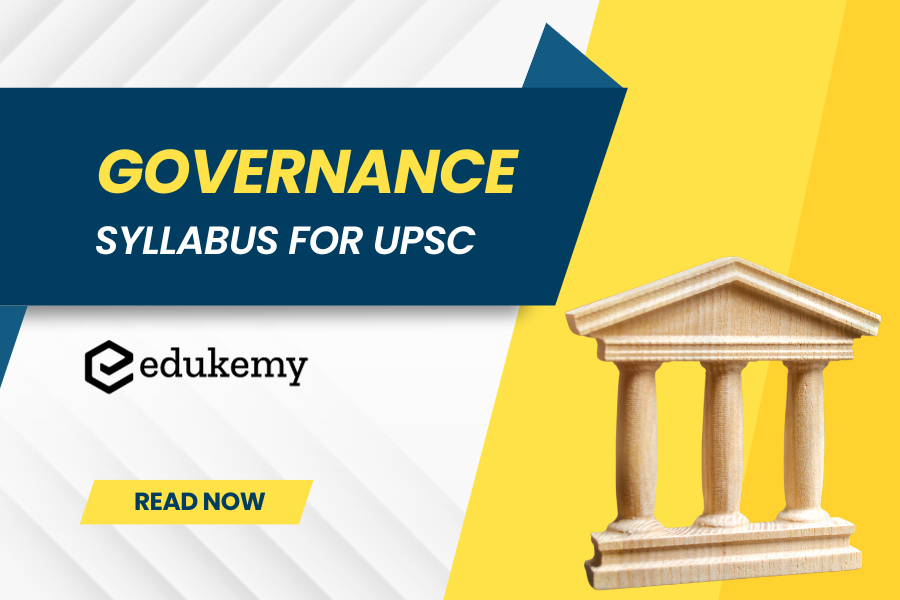
The governance syllabus for the Union Public Service Commission (UPSC) serves as a comprehensive guide for aspirants aiming to navigate the intricate landscape of governance in India. Designed to assess candidates’ understanding of the country’s administrative structures, policies, and the principles that underpin effective governance, this syllabus is a pivotal component of the Civil Services Examination. Covering a diverse array of topics ranging from constitutional provisions to public policy formulation and implementation, the UPSC governance syllabus demands a nuanced comprehension of the multifaceted challenges and opportunities inherent in the Indian administrative framework. Aspiring civil servants must engage with this syllabus to cultivate a holistic perspective on governance, preparing them to contribute meaningfully to the development and welfare of the nation.
Contents
- 1 Governance – Topics and Sub-Topics
- 2 FAQs for Governance Syllabus for UPSC
- 2.1 Q: What is the significance of the Governance syllabus in the UPSC exam?
- 2.2 Q: What topics are included in the Governance syllabus for UPSC?
- 2.3 Q: How does the Governance syllabus overlap with other subjects in the UPSC exam?
- 2.4 Q: What are the contemporary issues covered in the Governance syllabus?
- 2.5 Q: How can candidates effectively prepare for the Governance section in the UPSC exam?
- 3 In case you still have your doubts, contact us on 8792740517.
Governance – Topics and Sub-Topics
The UPSC (Union Public Service Commission) exam in India covers a wide range of topics related to governance. Here are some broad categories and sub-topics that are relevant for UPSC preparation:
- Constitutional Framework:
- Preamble of the Constitution
- Salient Features of the Constitution
- Fundamental Rights and Duties
- Directive Principles of State Policy
- Amendment procedures
- Indian Political System:
- Parliament and State Legislatures
- President, Vice President, Prime Minister, and Council of Ministers
- Governor and Chief Minister
- Federalism in India
- Local Governance:
- Panchayati Raj Institutions (PRIs)
- Municipalities and Urban Local Bodies
- 73rd and 74th Constitutional Amendments
- Public Policy and Governance:
- Policy formulation and implementation
- Planning and Economic Development
- Social Welfare Schemes
- E-Governance:
- Application of technology in governance
- Digital India initiatives
- Judicial System in India:
- Structure of the judiciary
- Supreme Court, High Courts, and Subordinate Courts
- Judicial Activism
- Corruption and Anti-Corruption Measures:
- Lokpal and Lokayukta
- Whistleblower Protection Act

- Human Rights Issues:
- National Human Rights Commission (NHRC)
- Protection of vulnerable sections
- Ethics and Values in Governance:
- Integrity, impartiality, and non-partisanship
- Code of conduct for public servants
- Accountability and Transparency:
- Right to Information (RTI) Act
- Citizen’s Charter
- Disaster Management and Emergency Provisions:
- National Disaster Management Authority (NDMA)
- State Disaster Management Authorities
- Security Issues:
- Internal Security Challenges
- Border Management
- International Relations and Governance:
- India’s foreign policy
- International organizations and treaties
- Environment and Sustainable Development:
- Environmental governance
- Conservation measures
- Gender Issues:
- Women’s rights and empowerment
- Laws and policies for gender equality
- Social Justice and Inclusive Growth:
- Reservation Policies
- Inclusive development programs
These topics cover a significant portion of the UPSC syllabus related to governance. It’s important to stay updated with current affairs and have a deep understanding of the historical and contemporary aspects of these subjects. Additionally, candidates should practice answer writing and develop a comprehensive understanding of the socio-political and economic issues facing the country.
FAQs for Governance Syllabus for UPSC
Q: What is the significance of the Governance syllabus in the UPSC exam?
Answer: The Governance syllabus is crucial as it covers various aspects of public administration, policy formulation, implementation, and evaluation. It helps candidates understand the functioning of the government, administrative structures, and the challenges in governance, which are essential for a career in the civil services.
Q: What topics are included in the Governance syllabus for UPSC?
Answer: The Governance syllabus typically includes topics like administrative reforms, accountability, transparency, e-governance, role of civil services in a democracy, citizens’ charters, and various government policies related to social and economic development.
Q: How does the Governance syllabus overlap with other subjects in the UPSC exam?
Answer: Governance is a multidisciplinary subject that intersects with topics in polity, economy, international relations, and ethics. Understanding governance enhances a candidate’s ability to analyze and address complex issues that require a comprehensive understanding of various domains.
Q: What are the contemporary issues covered in the Governance syllabus?
Answer: The Governance syllabus often includes current affairs and contemporary issues such as good governance, digital governance, citizen participation, ethical governance, and the impact of global developments on national governance. Candidates should stay updated on these issues for both the prelims and mains exams.
Q: How can candidates effectively prepare for the Governance section in the UPSC exam?
Answer: To prepare for Governance, candidates should focus on a combination of standard textbooks, current affairs magazines, government reports, and practice answer writing. Understanding real-world examples and case studies is essential. Additionally, staying informed about recent policy initiatives and developments in governance is crucial for success in the UPSC exam.
In case you still have your doubts, contact us on 8792740517.
For UPSC Prelims Resources, Click here
For Daily Updates and Study Material:
Join our Telegram Channel – Edukemy for IAS
- 1. Learn through Videos – here
- 2. Be Exam Ready by Practicing Daily MCQs – here
- 3. Daily Newsletter – Get all your Current Affairs Covered – here
- 4. Mains Answer Writing Practice – here

